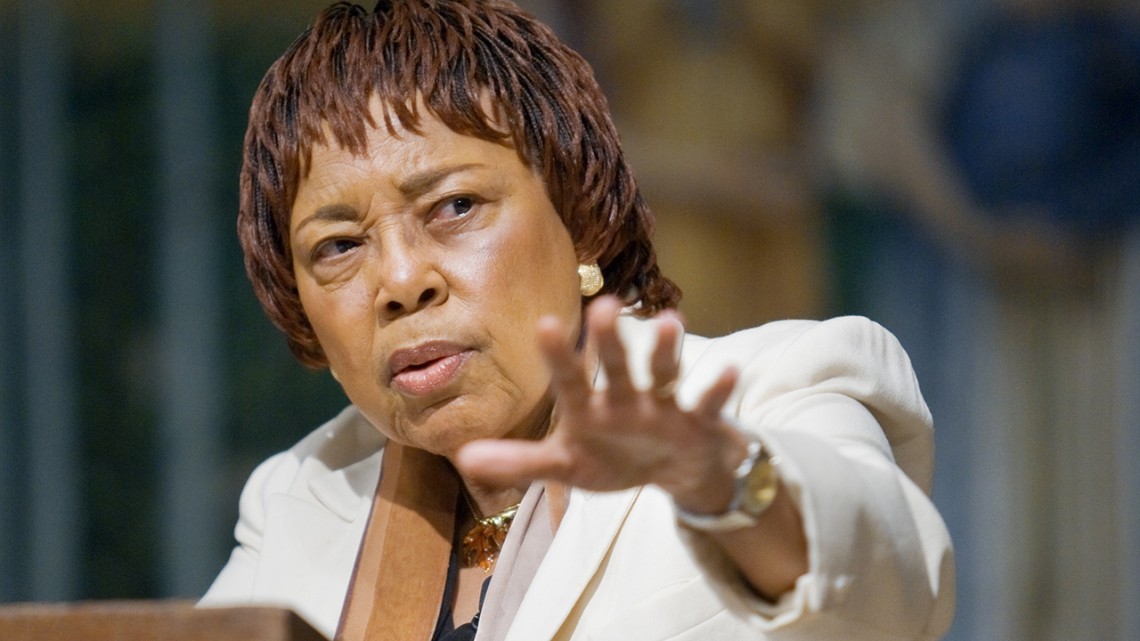
Dorothy Cotton delivers the annual Dr. Martin Luther King Jr. Commemorative Lecture Feb. 20, 2007, in Sage Chapel.
'Righteous warrior' Dorothy Cotton, civil rights pioneer, dies at 88
By Susan Kelley
Dorothy Cotton, who worked side by side with the Rev. Martin Luther King Jr. to empower African-Americans to exercise their civil rights, has died at age 88.
Cotton died June 10 at her residence in Kendal at Ithaca. Her health had been failing for the previous month.
Director of student activities at Cornell from 1982 to 1991, Cotton was a close colleague of King’s and the highest ranking woman in the Southern Christian Leadership Conference (SCLC). She directed the civil rights group’s Citizenship Education Program 1960-68, helping to make the country’s social and political life more equitable for people of color. She traveled with King to Oslo, Norway, in 1964 when he accepted the Nobel Peace Prize and was registered in the room next to his when he was assassinated in Memphis. She subsequently spent her life advancing civil rights as a strategist, community organizer, teacher and leader.
To carry her legacy forward, the Center for Transformative Action, a Cornell affiliate, established the Dorothy Cotton Institute in 2010 to promote a global community for civil and human rights leadership.
“Dorothy Cotton inspired many at Cornell and in the greater Ithaca area through her tireless work in the civil rights movement and as an advocate for diversity and inclusion,” said President Martha E. Pollack. “With her passing, our community has lost a powerful role model and a dear friend, who devoted her life to creating a more just and equitable world.”
The Rev. Kenneth I. Clarke Sr., former director of Cornell United Religious Work, said Cotton was a “life of the party person” who had a strong sense of right and wrong. “There was no ambiguity with Dorothy. She spoke her mind,” he said. “And if she disagreed with something, she would be very clear …. I think of her as a righteous warrior for civil and human rights, someone who made great sacrifices and risked life and limb ….”
Cotton was born Dorothy Lee Forman June 9, 1930, in Goldsboro, North Carolina. Her mother died when she was 3 years old, leaving her father, a tobacco factory worker, to raise her and her three sisters during the Great Depression.
Cotton studied English at Shaw University, where she worked as the president’s housekeeper to pay for her tuition. She earned a degree in English and library science at Virginia State University and a master’s degree in speech therapy from Boston University in 1960. In Virginia she met and married George Cotton, and joined a church involved in the civil rights movement. She heard King preach at the church and was soon invited to join SCLC in Atlanta.
With King, Cotton taught literacy, citizenship and nonviolent protest tactics, and motivated others to register to vote. She helped organize student participation in the 1963 Birmingham movement and its Children’s Crusade. She also directed the Citizen Education Program, which helped more than 6,000 African-Americans register to vote.
Until 1978 she served as vice president for field operations for the Martin Luther King Jr. Center for Nonviolent Social Change. She joined the Carter administration as the southeast regional director of ACTION, a federal agency for volunteer programs, serving from 1978 to 1981.
She then served as director of student activities at Cornell University, leading anti-oppression workshops and supporting students demonstrating for Cornell to divest from South Africa, said Laura Branca, senior fellow of the Dorothy Cotton Institute. “She was always encouraging people be bold, to believe in themselves, to be fully engaged and exercise our rights and responsibilities, and to not wait for someone else to follow.”
After leaving Cornell in 1991, Cotton founded a consulting company to focus on empowerment and social change.
The Dorothy Cotton Jubilee Singers, an Ithaca nonprofit that preserves the Negro spiritual tradition, was named in her honor by Baruch Whitehead, associate professor of music education at Ithaca College. “She used music to bring people together,” said Whitehead. “She used to sing these spirituals during the civil rights movement and would just change the lyrics to fit the times. …”
In 2007, Cotton spoke at Sage Chapel, reminding the audience of the lessons taught by the civil rights movement. “We learned that we could only make the road by walking it. We can use anger constructively to empower ourselves,” she said. “Most importantly, one of the greatest lessons it taught us was to never forget that government is by the people only if we make it so.”
In 2010, Cotton was awarded the National Freedom Award from the National Civil Rights Museum and the city of Ithaca declared Dec. 19 Dorothy L. Cotton Day in Ithaca. In 2012, she wrote a memoir, “If Your Back’s Not Bent: The Role of the Citizenship Education Program in the Civil Rights Movement.”
Cotton is survived by extended family in upstate New York and North Carolina. A private burial and a public memorial are being planned in Ithaca.
Media Contact
Get Cornell news delivered right to your inbox.
Subscribe
